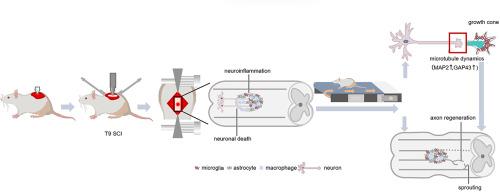Sports training improves motor function after spinal cord injury by regulating microtubule dynamics
IF 4.2
2区 生物学
Q2 BIOCHEMISTRY & MOLECULAR BIOLOGY
Biochimica et biophysica acta. Molecular basis of disease
Pub Date : 2024-11-23
DOI:10.1016/j.bbadis.2024.167587
引用次数: 0
Abstract
Spinal cord injury (SCI) often results in persistent disabilities, primarily due to deficient axon regeneration and irreversible neuronal loss. Sports training is a widely adopted intervention in clinical practice and research to promote axonal sprouting and synaptic plasticity, thereby improving motor function after SCI. However, the precise mechanisms by which sports training improves motor function after SCI remain incompletely understood. We established a rat model of T9 spinal cord contusion and initiated sports training 1 week after SCI, which continued for eight weeks. Using transcriptome sequencing validated through western blotting and immunostaining, we demonstrated that sports training effectively reduced neuroinflammation and prevented neuronal loss. Furthermore, we discovered that sports training changed neuronal microtubule dynamics, facilitating axon regeneration and synaptic plasticity and ultimately improving motor function. These findings indicate that the modulation of neuronal microtubule dynamics may represent a critical mechanism through which sports training improves motor function after SCI.

体育训练通过调节微管动力学改善脊髓损伤后的运动功能。
脊髓损伤(SCI)通常会导致持续性残疾,这主要是由于轴突再生不足和不可逆转的神经元缺失造成的。体育训练是临床实践和研究中广泛采用的干预措施,可促进轴突萌发和突触可塑性,从而改善脊髓损伤后的运动功能。然而,运动训练改善 SCI 后运动功能的确切机制仍未完全清楚。我们建立了一个 T9 脊髓挫伤大鼠模型,并在脊髓损伤后 1 周开始运动训练,持续 8 周。通过转录组测序和免疫印迹验证,我们证明运动训练能有效减少神经炎症并防止神经元丢失。此外,我们还发现体育训练改变了神经元微管动力学,促进了轴突再生和突触可塑性,最终改善了运动功能。这些发现表明,对神经元微管动力学的调节可能是体育训练改善损伤后运动功能的关键机制。
本文章由计算机程序翻译,如有差异,请以英文原文为准。
求助全文
约1分钟内获得全文
求助全文
来源期刊
CiteScore
12.30
自引率
0.00%
发文量
218
审稿时长
32 days
期刊介绍:
BBA Molecular Basis of Disease addresses the biochemistry and molecular genetics of disease processes and models of human disease. This journal covers aspects of aging, cancer, metabolic-, neurological-, and immunological-based disease. Manuscripts focused on using animal models to elucidate biochemical and mechanistic insight in each of these conditions, are particularly encouraged. Manuscripts should emphasize the underlying mechanisms of disease pathways and provide novel contributions to the understanding and/or treatment of these disorders. Highly descriptive and method development submissions may be declined without full review. The submission of uninvited reviews to BBA - Molecular Basis of Disease is strongly discouraged, and any such uninvited review should be accompanied by a coverletter outlining the compelling reasons why the review should be considered.

 求助内容:
求助内容: 应助结果提醒方式:
应助结果提醒方式:


